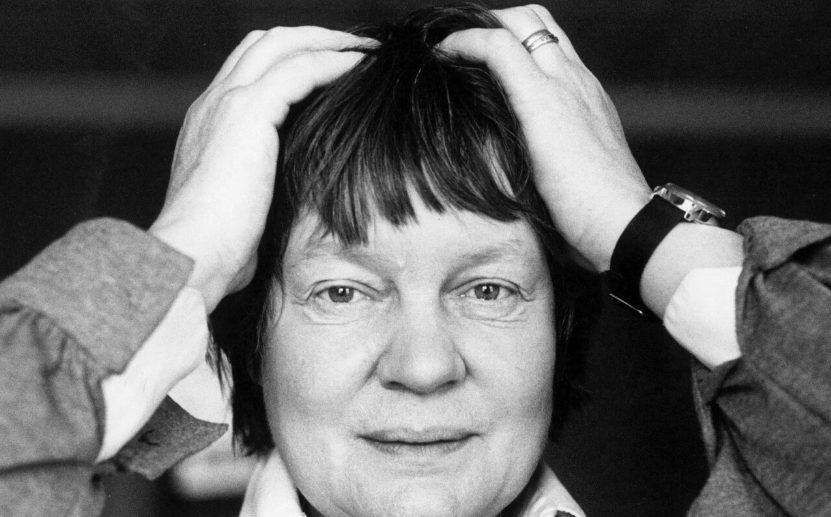Iris Murdoch, Autism, and the Importance of Recognising Otherness
In an unpublished paper in 2021, Michael Fitzgerald, Professor of Child and Adolescent Psychiatry at Trinity College Dublin, posthumously diagnoses Iris Murdoch as autistic. He opens:
Iris Murdoch was one of the small handful of major English writers in the 20th century. She was born in Ireland. She had autism. She was a complex, contradictory, enigmatic personality and she also was a linguist and philosopher. She had sexual identity diffusion but mostly, engaged in heterosexuality. She was a compulsive writer. She wrote largely from her imagination or interior world. She had social relationship issues, narrow interests, preservation of sameness, sensory issues, and some possible evidence of autistic narrative.
(Fitzgerald, 2021)
This, of course, raises questions and problems. While an interesting hypothesis, what about the ethical and logistical issues of diagnosing somebody you have never met or communicated with, let alone after they have died? And, if this hypothesis is taken to be true, how does that affect the way we might read Murdoch's fiction and philosophy? Furthermore, why does it matter at all if Murdoch was autistic, or was interested in autism, or wrote about autism, or wrote in an 'autistic' way?
Murdoch wanted people to understand the diversity of human minds, as one of her central aims of both her fiction and philosophy and, by reading her fiction through the lens of neurodiversity, we can ourselves achieve this aim. Not only this, but Murdoch wanted people to understand the benefits of diversity to our moral wellbeing, both by accepting oneself as a unique individual, and by fully accepting that diversity in others.
Murdoch was interested in autism. She owned several books about autism, such as neuropsychiatric aspects of perceptual, motor and attentional deficits in seven-year-old Swedish children by Christopher Gillberg, and three copies of The Biology of Autistic Syndromes, by Christopher Gillberg and Mary Coleman. She was also interested in mental illness, and owned books such as The Psychology of Insanity by Bernard Hart, On Birth and Madness by Eric Rhode, and Suicide and the Soul by James Hillman, which she annotated heavily. She also, as is well known, suffered from depression herself, alcohol addiction, and, later in life, was of course diagnosed with Alzheimer's. While we don't (and can't) know for certain whether she was in fact autistic, we can observe her language and behaviour to find out what perhaps autistic traits she displayed. Furthermore, Murdoch wrote about autism and mental illness in her fiction. They are, in fact, central subjects of some of her novels, such as The Philosopher's Pupil.
At the heart of The Philosopher's Pupil is George McCaffery, a paranoid, mentally and emotionally unstable, violent and dangerous man. The novel begins with George experiencing what Murdoch provisionally terms ‘a brainstorm’. This is a significant term which Murdoch also used in The Black Prince to describe episodes which Bradley experiences. He also appears to suffer from a form of Tourette's: he will often make inappropriate interjections into conversations, repeating phrases like ‘Buzz buzz. Hickory Dickory Dock’ and ‘hey nonny nonny’. He is characterised as prone to violent thoughts and actions, such as losing his job at the museum by smashing all the Roman glass, and of course at the end when he murders Rosanov. He frequently experiences paranoia, living his life, as Murdoch writes, unwaveringly seeing ‘the world as a conspiracy against him, and himself as a victim of cosmic injustice’. He also sometimes experiences episodes of depersonalisation. This is seen in the description after his experience saving Zed at the beach:
Beyond, lay insanity. That morning he had looked at his body, at his hands and feet and what he could see of his trunk, and felt his grasp of his being waver. What was this pallid crawling object? He had stared at his face in the mirror and felt mad, as if he might have to rush whimpering and slobbering into the street and ask to be arrested and looked after.
And, later on, he experiences a severe episode of depersonalisation:
George closed his eyes and tried to breathe slowly and deeply. That awful giddiness was coming upon him, that physically announced loss of identity, a most intense sense of his body, of its bulky heavy solidity and of his various views of it, combined with the absolute disappearance of its inhabitant. This suddenly heavy painful body-presence produced a kind of seasickness and a heavy metaphysical ache. He thought, hold on, it will pass. Then somewhere inside the sick weight where he no longer was came the thought, where is Stella, where IS she?
Others see him as mad: it is said that he ‘lives in a fantasy world’. N, the narrator, suggests to Stella that George is ‘mad’ or ‘epileptic’ and/or requires ‘electric shocks’. Pearl thinks George is ‘simply mad’. Diane at one point worries that George is ‘mad’ and that ‘he ought to be in an asylum chained to a wall’ and worries that ‘he’ll kill me one day’. Tom worries about ‘whether George had not at last perhaps, and finally, gone mad’. And praises his ‘normal’ behaviour, when it occurs: at the beach, the family are having a conversation during which it is noted that:
there had been a little perhaps absurd surprise at the spectacle of George behaving in a perfectly ordinary way. (Yet how did they expect him to behave?) George displayed no eccentricity except that, while answering Emma’s questions, he stared fixedly at Hattie. He had taken off his jacket and waistcoat, displaying a new plumpness. His round face looked pleased and calm, and his stare was benevolent enough though intense.
In the same passage, Gabriel ‘could not help looking [at George] with a little smile which expressed, look how GOOD he’s being’, and turns ‘to Brian, indicating George’s splendidly normal behaviour with an approving nod’.
George is praised when he is acting ‘normally’, and feared when he is not. He is also, of course, a murderer. What does this say about Murdoch’s perception of the ‘mentally different’? George has good moments and bad moments. He does bad things, but he also does good things. George is a hero when he saves Zed. He is, also, an eloquent and invested moral philosopher. He thinks and speaks about morality in a highly analytical way in his obsession-fuelled letters to Rozanov. The text implies, then, that human psychology (and thus, human morality) is not black and white. George can do bad things, but can also perform truly good acts, and (Murdoch implies) his mental disability/difference does not hinder him in this capacity, which any other human also holds. It is also not necessarily his mental disability/difference which makes him do bad things; his murder of Rosanov was caused by his obsession with him, which is rather separate from (though interrelated with) his mental illness. Mental difference/illness is not ipso facto badness, then, and it also does not constitute moral ineptitude.
Stella, furthermore, is truly good because she loves George, in the end, in spite of his mental difference. At the end of the novel George takes a period of ‘mild drugs’, which cause him to become ‘a changed, and still changing man’ and make him more ‘ordinary’. N asks Stella ‘whether a quiet, docile George continues to interest her’, to which she replies that ‘most emphatically that he does, and that she loves him now in a new and better way.’ She loves him whether ill or well, in either state, and cares for him in spite of herself, in spite of danger to herself (she still worries, despite George’s ‘improvement’, that ‘he will one day suddenly attack her with an axe’). Therefore recognising and loving others despite their difference/illness is a high moral value act to Murdoch. Not only recognition of and attention to, but also acceptance of, and love towards, mental difference is key to moral goodness for Murdoch.
While it may not be productive to diagnose a writer you have never met or communicated with, it is clear that Murdoch was aware of mental illness and mental difference as a psychological concept. Not only this, but she dealt with it as a subject in her fiction in a highly nuanced way. Perhaps progressively, mental illness and mental difference is not, for Murdoch, something which excludes you from the world of moral philosophy. It, in fact, not only includes, but requires you. The act of recognition of others as being other, and loving them truly for it, is at the centre of Murdoch’s philosophy, and thus her fiction. And is that not the fundamental principle of neurodiversity?

